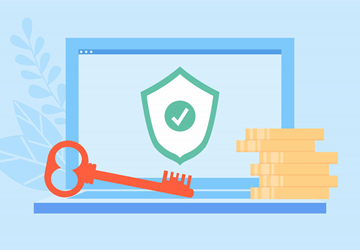Cryptocurrency scams are common and often done well. Here are some steps you can take to protect yourself:
Protect your wallet: To invest in cryptocurrencies, you must have a wallet with a private key. Unfortunately, when a company asks you for a key in order for you to participate in a financial opportunity, it's likely to be fraudulent. So please keep your wallet keys safe.

Monitor your wallet app: Send money to check app validity. If you notice unusual activity while updating the wallet app, stop the update and delete the program.
Only invest in areas you are familiar with. If you're not sure how a particular cryptocurrency works before deciding whether to invest, be sure to pause and do some further research.
Keep Calm: Scammers sometimes use high-pressure techniques to trick you into spending money right away, such as: B. Through a reward or deduction if you do it right away. So, before you make any financial commitments, take the time to do your research.
Social media ads should be avoided as they are often used by cryptocurrency scammers to promote their fraudulent schemes. For example, they might use unlicensed images of celebrities or well-known entrepreneurs to give the impression of believability, or promise freebies or free money. So when you see cryptocurrency prospects being touted on social media, maintain a healthy dose of skepticism and do your research.
Avoid Strange Calls: When someone accidentally approaches you and suggests a cryptocurrency investment opportunity, it's a scam.
Download programs only from reputable stores: While fake apps may appear on the Google Play Store or Apple App Store, you should only download apps from here.
Do your homework; the most widely used cryptocurrency is not a scammer. However, if you've never heard of a particular cryptocurrency, do some research. Check for the existence of a white paper, find out who controls it and how it works, and look for genuine reviews and advice. Finally, look for an up-to-date and reliable list of fake cryptocurrencies to avoid scams.
When a company offers guaranteed returns or claims it can make you rich overnight, it can be too good to be true. Be careful when something sounds too good to be true.
Finally, no matter the opportunity, don't use money that you can't afford to lose on your investment. Understanding the risks is crucial because cryptocurrencies are volatile and speculative even if you are not being scammed.

What to do if you're a victim of a cryptocurrency scam
If you have already paid or provided personal information, it is important to act quickly to avoid becoming a victim of a Bitcoin scam.
• Contact your bank immediately if you:
• Pay by credit or debit card.
• Pay by bank transfer.
• Share personal information about yourself.
Information obtained by cryptocurrency scammers is often sold to other scammers. Therefore, it is imperative to update the passwords and usernames of all your accounts to prevent further damage. If you are the victim of a crypto scam, you can report the crypto scam to the relevant social network. Additionally, you can report fraud to the appropriate government agency in your area, such as the B. U.S. Federal Trade Commission.
